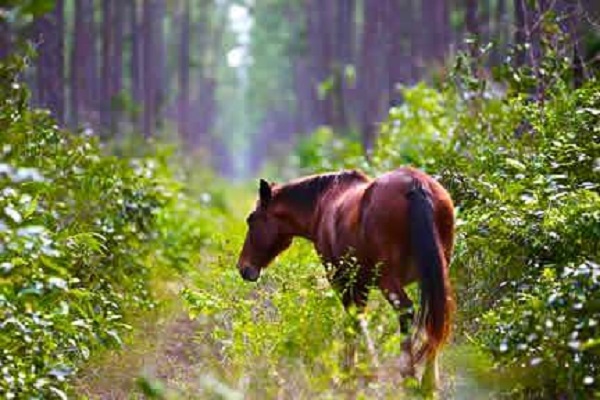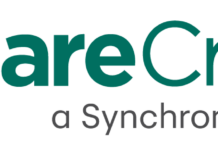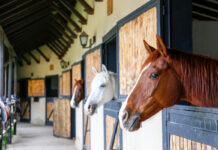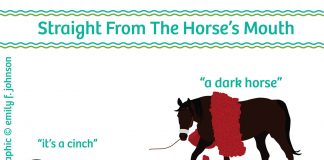
Great Abaco Island in the Bahamas was home to wild horses, known as Abaco Barb or Abaco Wild Horse. The breed was brought over by a logging company from Cuba sometime toward the end of the 1800s. By the 1940s, when the company began utilizing tractors, the 200 horses were set free, ABC News reports. In the 1960s, a child came upon one of these horses and tried to ride it. It goes without saying how dangerous attempting to ride a wild horse can be and unfortunately the child died.
As a result of that incident, “All but three [of the horses] were slaughtered,” according to the Abaco Preservation Society Facebook page, “They came back to 35 animals by the mid 1990s. But a hurricane pushed the horses out of their now destroyed forest habitat, where they had thrived for so long, into a lush and toxic citrus plantation that was hurricane-damaged and littered with chemicals, destroyed buildings, too-rich pastures, and poisonous plants.”
An endangered breed, the Abaco numbers went from 200 a mere 60 years ago to just one in recent years. Sadly, that one horse, a mare, has died. Her name was Nunki. She was 20.
The Wild Horses of Abaco Preservation Society project director, Milanne Rehor, told ABC News that a veterinarian from the United States took tissue from the mare. The tissue was then sent to Austin, Texas for an attempt at cloning to bring back the breed.
“We are sad at the loss. But we are also optimistic because we do have a crack at bringing the herd back,” Rehor told ABC News.
Wild Horses of Abaco Preservation Society believes the bloodlines are worth saving due to their unique historical significance. According to their Facebook page:
Wild Horses of Abaco’s primary objective is the prevention of the extinction of the Abaco Wild Horses, now to be known as the Abaco Spanish Colonials. DNA proven to be direct descendants of the horses brought to the New World by the Spanish Conquistadores.
While Rehor is hopeful the cloning will work, others are doubtful that such a plan will succeed. A clinical professor with the Department of Veterinary Medicine and Biomedical Sciences at Texas A&M University, Ernest Cothran, told ABC News that even though he wouldn’t say the attempt is impossible, he would be surprised if it worked.
What do you think? Can cloning bring back the wild horses of Great Abaco Island?
Liked this article? Check out these about the Abaco wild horses:
Wild Horses on Great Abaco Island
The Man Behind the Lens






Only tissue from one mare…. I would say that’s asking a lot from Science…. If they had more of a genetic diversity I’d think it possible, but just one mare….
Just import more spanish barbs from other Caribbean islands or Panama. There are plenty around. These island horses were only special because they were on Great Abaco. They were inbred and probably needed new genetic richness to survive.
What use is there in bringing them back when the people were too stupid to care for them.
r
It would be nice to have to a descendant of these wild horses, but to save their breed, just to have them slaughtered again….why?? It would be better just to help the horses that we have now. Think about the horses on their way to Mexico or Canada, and the once waiting in kill pens hoping that someone can safe them.
Science? Ever wondered what would happen if the Frankenstein Dr. were real and the monster was created some things are better left alone let nature take its course and really need to stop playing God for everything what is next actually cloning the dinosaurs back into existence.
Cell growth has been successful, and the cloning will begin as soon as we have enough funds to do so, this isn’t just about putting horses back on the island, it is about saving a BREED of horse from extinction, which is the primary goal, if a safe place for the horses cannot be obtained on the island, they will not be returned there, but their unique genetics will at least be preserved, please follow the progress on our Facebook page at Wild Horses of Abaco or at our website http://www.arkwild.org